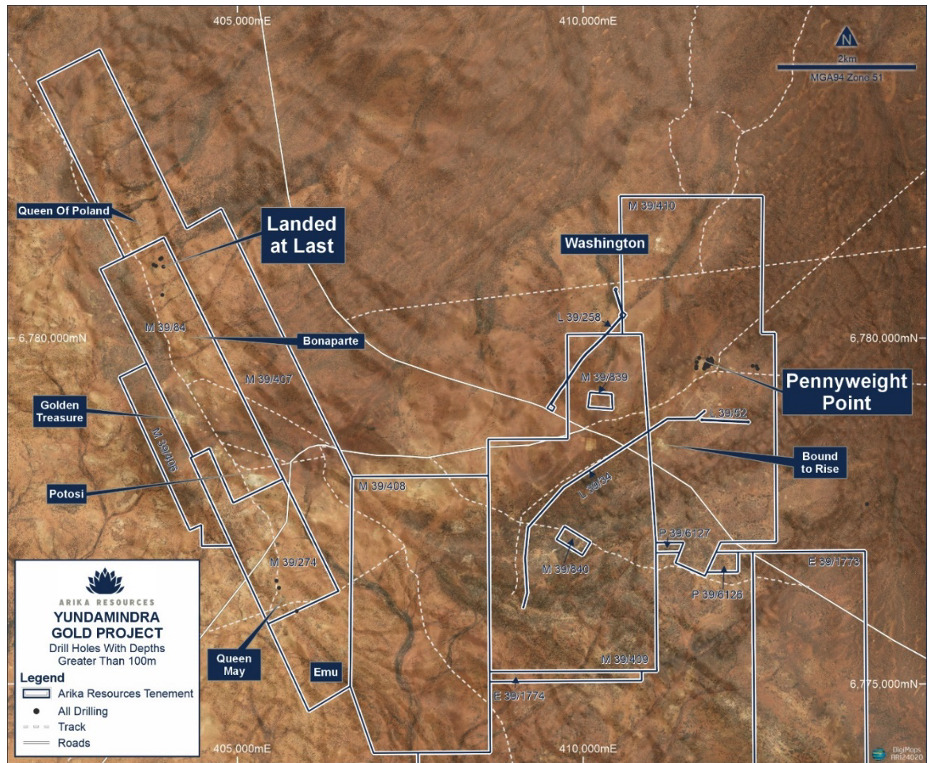Arika Resources data review flags major gold scale potential at Yundamindra

Much of the Yundamindra project area remains unexplored. Pic: via Getty Images
- Arika Resources’ latest data review highlights historical holes at Yundamindra site were less than 80m deep
- This points to depth and strike potential of the WA gold project
- Company plans to recommence drilling next week
Special Report: Arika Resources says a review of geoscientific datasets over its Yundamindra gold project in WA has revealed the majority of historical holes drilled in the 1980s-1990s were shallow – meaning there is potential for significant depth and strike.
The project is situated toward the westernmost margin of the Laverton Greenstone Belt, one of the best-endowed gold regions in Australia, hosting two world-class producing mines, namely: Sunrise Dam at 8moz contained gold and Wallaby at 7moz contained gold.
The project is a joint venture between Arika Resources (ASX:ARI) and Nex Metals (ASX: NME) in which Arika holds 80% and NME holds 20%, with Arika acting as project manager.
Arika has discovered the historical holes were restricted to the near-surface weathered zone, with ~75% drilled to depths of less than 50m and ~97% drilled to depths of less than 80m.
The data highlights clear depth and strike potential across the greater project area including the Pennyweight Point and Landed at Last prospects where Arika’s recent maiden drilling campaigns reported a series of exceptional and extensional results including:
- 14m at 15.48 g/t gold from 46m (Pennyweight Point);
- 33m at 3.35 g/t gold from 22m (Pennyweight Point);
- 33m at 2.63 g/t gold from 85m (Pennyweight Point);
- 30m at 2.26 g/t gold from 26m (Landed at Last);
- 40m at 1.22 g/t gold from 30m (Landed at Last) and
- 26m at 1.46 g/t gold from 22m (Landed at Last)
In fact, the entire Western Corridor (Landed at Last) remains unexplored beneath 80m depth over a strike length in excess of 10km.

Significant upside potential
Arika says the data shows the significant potential upside of this project and the high prospectivity of a significant gold discovery at depth and along strike, in an area that is similarly structurally hosted and within 30km of several multi-million-ounce resources.
The plan is to recommence drilling at Pennyweight Point and Landed at Last next week, to test extensions of the prospects along strike and at depth.
“Having completed a highly successful maiden drilling program on three prospects at Yundamindra, which delivered outstanding results, we are excited to provide an update of our review and analysis of all historical data and our recent drilling results,” ARI managing director Justin Barton said.
“Despite the project appearing to have seen extensive drilling, mainly in the ’80s and ’90s, analysis shows that ~97% of all historical holes were restricted to the weathered zone and drill depths of less than 80m, where drilling was essentially blade refusal (RAB/aircore) targeting shallow high-grade oxide resources.
“This presents an exciting opportunity for Arika as the mineralisation essentially remains unexplored at depth and along strike, providing a great opportunity for a significant further gold discovery outside of the shallow oxide as we chase the source of the mineralisation in the underlying bedrock and along strike.
“As we continue to review all geological and geochemical data, we are also eager to recommence drilling, anticipated to re-start next week, as we begin to test the extensions to the Pennyweight Point and Landed at Last prospects.”
The company will also complete ultra-detailed magnetics, ultra-detailed gravity and Sub-Audio Magnetics surveys to provide more precise mapping of faults and shears on a localised scale – which will be critical for focusing ongoing exploration.
This article was developed in collaboration with Arika Resources, a Stockhead advertiser at the time of publishing.
This article does not constitute financial product advice. You should consider obtaining independent advice before making any financial decisions.
Related Topics

UNLOCK INSIGHTS
Discover the untold stories of emerging ASX stocks.
Daily news and expert analysis, it's free to subscribe.
By proceeding, you confirm you understand that we handle personal information in accordance with our Privacy Policy.








